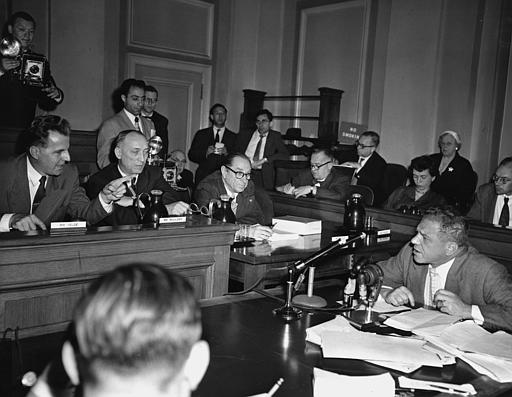In Watkins v. United States, 354 U.S. 178 (1957), a 6-1 decision with two justices not participating, the Supreme Court ruled that the conviction of John Watkins for contempt of Congress was invalid under the due process clause of the Fifth Amendment. The case also implicated First Amendment rights of privacy and association.
Union organizer convicted for refusing to answer questions of congressional committee
On April 29, 1954, John Watkins, a labor organizer for the United Automobile Workers, appeared before the House Un-American Activities Committee (HUAC). The government admitted in its brief that “[a] more complete and candid statement of [Watkins’] past political associations and activities can hardly be imagined,” but Watkins had refused to answer questions about the past activities of those who were no longer members of the Communist Party.
Watkins could not invoke his Fifth Amendment privilege against self-incrimination, so he argued that the questions were irrelevant to the investigation. After the House voted him in contempt, and he waived his right to a jury trial, a district court found Watkins guilty on all seven counts. A three-judge panel of the District of Columbia Circuit Court of Appeals reversed the conviction, with one member dissenting, but upon rehearing en banc, the full bench reaffirmed the conviction.
Court overturned conviction, raised questions about First Amendment freedom
In the opinion for the majority, Chief Justice Earl Warren acknowledged that the power of Congress to conduct investigations is broad, but not unlimited. Although the Court used the Fifth Amendment in ruling that Congress had committed the “vice of vagueness” by not giving Watkins sufficient information to determine if the committee’s questions were pertinent to the “functions of Congress,” it also found that this flaw in the process exposed him to possible infringements of his First Amendment freedoms.
Warren noted, “there have been few cases requiring judicial review of the power” of Congress to conduct investigations. Watkins, however, builds on precedents set by the Court in Kilbourn v. Thompson (1881) and United States v. Rumely (1953). For Warren, Kilbourn “teaches that such an investigation into individual affairs is invalid if unrelated to any legislative purpose,” and Rumely concludes “that, when First Amendment rights are threatened, the delegation of power to the committee must be clearly revealed in its charter.”
Warren used these precedents to support the Court’s ruling that Watkins’s contempt conviction was invalid because the subject matter of the inquiry had not “been made to appear with undisputable clarity.”
As the lone dissenting voice, Justice Tom C. Clark argued, “I do not see how any First Amendment rights were endangered here.”
Court later upheld First Amendment limitations on legislature investigations
Two years later, in Barenblatt v. United States (1959), a direct First Amendment challenge to the House’s investigation of the Communist Party, a divided Court ruled that First Amendment interests were overridden by those of Congress in ensuring America’s self-preservation.
The Court maintained this stance until Gibson v. Florida Legislative Investigation Committee (1963), when it recognized First Amendment limitations on the scope of a state legislative investigation. In the few subsequent cases on the question since, the Court has continued to recognize First Amendment limitations on the scope of legislative investigations.
This article was originally published in 2009. Dr. Tim Meinke is currently Professor of Political Science at The University of Lynchburg. His teaching and research interests include state and local politics, public policy, political philosophy, and First Amendment issues. He was awarded the 2013-14 Shirley E. Rosser Award for Excellence in Teaching, which is the University’s highest teaching honor. He also teaches an annual class on American politics which uses First Amendment issues as the case study for the semester’s coverage of public policy.

